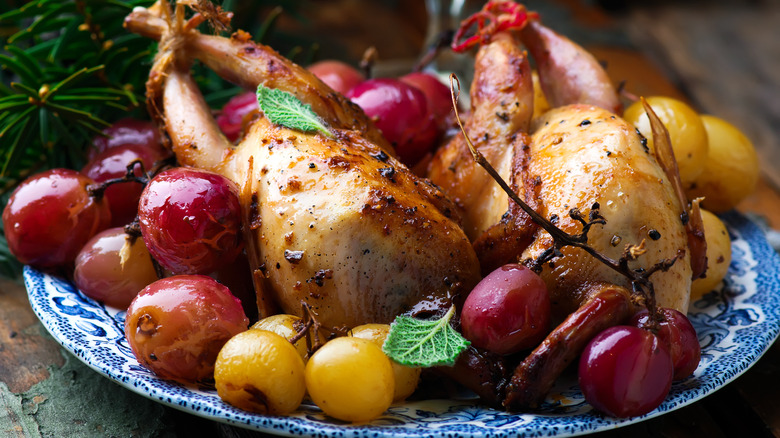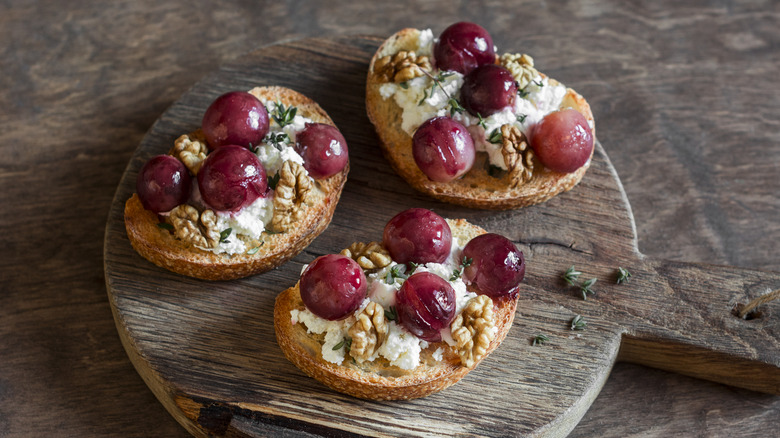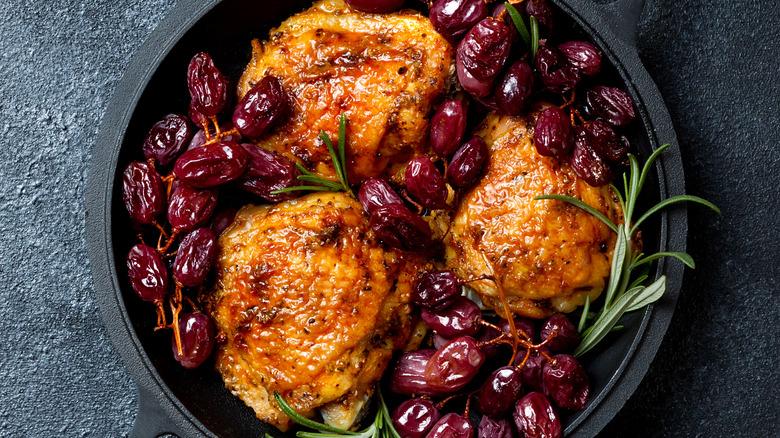If You're Not Roasting Grapes, You're Missing Out On Serious Flavor
Grapes are usually eaten fresh off the vine and are seldom prepared in elaborate ways. Sometimes, people freeze them, and there was once a TikTok trend where people would coat them in sugar. However, grapes aren't typically cooked. Despite this, roasting grapes is a delicious alternative to consuming them cold.
The concept of roasting grapes might seem unusual at first, but it yields results similar to when you bake apples or berries in a pie or make bananas foster. When grapes are roasted, their natural sugars caramelize, intensifying their sweetness and giving them a wine-like flavor that is richer and has more depth.
To achieve this, start by coating your grapes in oil and seasoning them to your liking. There's no need to slice them up; simply arrange them in a roasting pan and bake them at 400 degrees Fahrenheit for around 15 minutes or until the skin starts to blister. This process transforms the grapes into a uniquely sweet ingredient that complements a variety of dishes.
How to serve roasted grapes
Roasted grapes maintain a flavor profile similar to when they're in their uncooked state, which allows them to be seamlessly incorporated into familiar pairings such as wine and cheese or featured on a charcuterie board. However, don't hesitate to explore beyond these traditional uses. The sweetness of roasted grapes also complements the sharpness of alliums like onions and garlic, balancing out their pungency. Similarly, pairing roasted Brussels sprouts and grapes can offset the vegetable's natural bitterness, creating a satisfying contrast in flavors.
If you're not sure exactly how to integrate roasted grapes into your meals, try substituting them in recipes that already call for grapes or caramelized fruits. For example, there are many recipes for grilled pears where roasted grapes could work well, such as grilled pear and prosciutto flatbread. For a sweeter twist, try using them in schiacciata all'uva, a Tuscan dish where grapes are baked into focaccia.
Could roasting grapes too long turn them into raisins?
If you've never attempted to roast grapes, you might worry that baking them would dry them out, leaving you with an outcome that resemble raisins. However, it actually results in a quite different texture. While they do lose their original firmness and juiciness, they do not dry out completely and instead turn jammy. This transformation is due to the high pectin content in grapes, which, when heated, helps the fruit develop a thick, jam-like consistency. This is also why grapes are commonly used in jam-making.
To avoid ending up with raisins, all you have to do is control the roasting conditions. Raisins are the result of sun-drying or oven-drying grapes at low temperatures over several hours until they're dehydrated. In contrast, by baking grapes at a higher temperature for a shorter duration, much of their moisture will be preserved. As long as you roast them properly, they'll develop that jammy, flavor-packed quality instead of turning into raisins, allowing them to be used in a variety of recipes.


